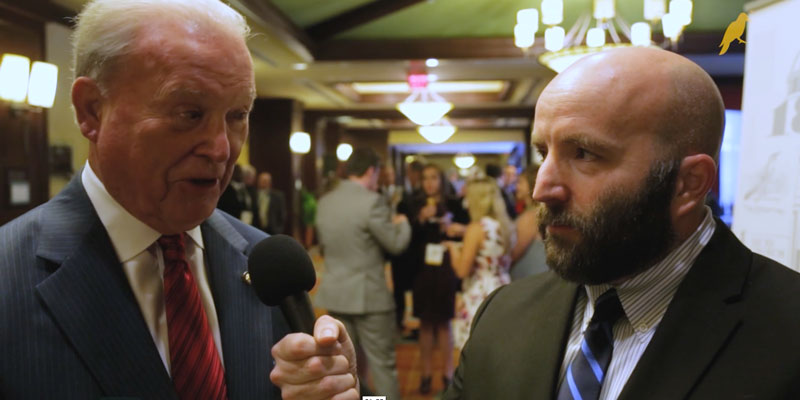Cord Sachs is a Birmingham-based leadership expert and the CEO of FireSeeds, a company that helps companies find and grow great leaders and “the company behind many of Alabama’s fastest growing companies.”
The full conversation with Mr. Sachs can be heard on the Yellowhammer Radio podcast or in the video above, and a lightly edited transcript of his interview with Yellowhammer’s Andrea Tice and Scott Chambers can be read below.
Subscribe to the Yellowhammer Radio Podcast on iTunes. Learn more about Cord Sachs and Fireseeds at www.fireseeds.com
Scott Chambers:
And we are joined by our good friend as we do each and every single Wednesday, Tuesday rather, here on Superstation 101 on Yellowhammer Radio.
Andrea Tice:
You’ve got your days mixed. It’s okay.
Scott Chambers:
I’m trying to jump to Friday for some reason. I don’t know why, but I keep wanting to think today’s Wednesday. Today’s Tuesday.
Andrea Tice:
You want to get to Friday because of what? The Gorsuch nomination confirmation.
Scott Chambers:
Get Neil Gorsuch on the Supreme Court.
Andrea Tice:
There you go.
Scott Chambers:
Then, I’m gonna eat pizza and have a cold drink and just enjoy my weekend. Go to church, come back, start over, do it all again on Monday.
Andrea Tice:
Okay.
Scott Chambers:
I’m just ready for the weekend already. That’s what I am ready for.
Andrea Tice:
We are almost through Tuesday.
Scott Chambers:
Yes.
Andrea Tice:
And then, it’ll be Wednesday.
Scott Chambers:
Right, exactly.
Andrea Tice:
But, we gotta talk to Cord first.
Scott Chambers:
Yes, joined by our friend Cord Sachs with FireSeeds who is leveraging 15 years of recruiting and leadership development experience. Cord launched FireSeeds to recruit dynamic leaders and install leader development strategies in a world changing business. We’ve been talking about for weeks and weeks now, we started out from the boardroom to the family room, and continuing on our great conversation, let’s welcome him in. Cord Sachs, welcome into Yellowhammer Radio. How’s it going today?
Cord Sachs:
Doing great Scott, Andrea. How are you guys?
Scott Chambers:
Living the dream. Living the dream.
Andrea Tice:
Yup. Dittos.
Cord Sachs:
Awesome.
Scott Chambers:
Living the dream. We, today, are going to talk about personal identity. Personal identity is what we’re gonna talk about today, as we discuss boardroom to the family room. Now, personal identity, depends on what show you’re listening to. This has nothing to do with people changing. This is … Tell us what personal identity means. What do you actually mean when you say identity, Cord?
Cord Sachs:
That’s right. It doesn’t have anything to do with anybody changing. It doesn’t have anything to do with what’s on your license or the uniqueness of your fingerprints. What we mean is how you’ve been hardwired by God, with a certain personality, certain strengths, certain preferences that are completely unique to you. That is your personal identity. There’s also as much as like identity assessments, personality assessments, temperament assessments out there on the market. They’re very popular. Have you guys ever taken one of those?
Scott Chambers:
I have not.
Andrea Tice:
I believe I have awhile ago. I think a personality assessment, I’m not sure. It’s not coming to me.
Cord Sachs:
Do you like it? Did you resonate with it? Was it uncomfortable? What was your impression?
Andrea Tice:
No, I think at the very end, it confirmed what you’d already suspected. You’re just like, “Oh, okay.” It almost kinda gave you permission to be who you are.
Cord Sachs:
Very good. That’s the [crosstalk 00:02:23]
Scott Chambers:
I haven’t taken one, but I know God made me an awesome human being and I’m happy with who I am. I like my personality.
Cord Sachs:
Well, we need to affirm that and do an assessment on you just so you can understand how that all plays out in life.
Scott Chambers:
Okay.
Cord Sachs:
I know different people have different responses to that question. Some feel like, “I don’t like them ’cause I’m being put in a box.” Other people do have aha moments in their lives where they say, “Wow, yes. That’s who I am,” much like Andrea. Today, we’re gonna do the top 10 reasons why understanding your identity should be a top priority for everyone.
Andrea Tice:
Oh, okay. Top 10 reasons. All right, what would be the very first one that you would want to tell us about?
Cord Sachs:
Well Scott, I’ve given you all 10, so I’ll let you kinda go down the list and I’ll make a brief comment on each one. How about that?
Scott Chambers:
Yeah, let’s do that. We’ll start at number 10 ’cause you know when David Letterman was doing his countdowns each and every night on TV, he started at number 10 and worked his way back to one. Can we do that Cord?
Andrea Tice:
Oh, I see.
Cord Sachs:
Well, start with … Let’s do that, but go and start with one down to 10 on my list.
Scott Chambers:
All right, okay.
Cord Sachs:
It’s flow a little better. So start with 10.
Scott Chambers:
All right. Number 10: You can sound really smart when you can talk about three parts of the mind.
Cord Sachs:
That’s right. The assessment … All the identity assessments out there help us really understand the three parts of our minds. That’s what we know, we know things, we feel things, and we do things. We can understand how that practically applies in all the different areas of how we’re gonna interact with people and how we’re gonna accomplish tasks. We can talk about that in a known way. It makes us sound smart. That’s number 10.
Scott Chambers:
All right. Number nine: Identity assessments helped us win World War II.
Cord Sachs:
Absolutely. World War I, soldiers were placed randomly into job positions. It’s wasn’t ’til after World War I that the social scientists said, “Hey, if we can assess individuals based on their strengths, maybe we could then align them with jobs that would make sense, instead of just randomly plugging one as the machinist and one as the pilot and one as the machine gunner.” These social scientists take a lot of credit for these assessments being introduced pre-World War II and that being one of the main reasons we’re not a communist country today.
Scott Chambers:
Exactly.
Andrea Tice:
Okay, I’m gonna read number three. It says here …
Scott Chambers:
Number eight.
Andrea Tice:
What’d you say?
Scott Chambers:
Number eight. Number eight, Andrea Tice.
Andrea Tice:
I’m sorry. You’re right, okay. I’m off on the numbers, but I’ve got it right. You say, it could …
Cord Sachs:
We’re actually on seven though. We’re having a hard time counting, but down to seven.
Andrea Tice:
Down to seven: It could save your marriage.
Cord Sachs:
It could save your marriage. Absolutely. In fact, it saved mine. The first five years of my marriage, I had no idea getting in, how I could’ve known someone pre-marriage and then found out she was so different from me. It wasn’t until someone helped us and unpacked a couple identity assessments with us together, that we realized where those differences came from. When I came home as the visionary, excited about a brand new idea and she would have a hundred questions for me, and I would walk outta the room deflated, I finally learned that was a strength for her to gain information before she could feel good about something. Until I knew that, I couldn’t value that. I saw that as a threat. But when I learned about our identities, we valued each other and our marriage has not been the same since.
Scott Chambers:
Wow.
Andrea Tice:
Wow, that’s great to hear.
Scott Chambers:
Number seven, people are definitely gonna want to hear this one: It could earn you a promotion.
Cord Sachs:
That’s right. I can’t tell you how many times we consult with different organizations and let’s just give an example. They take the top sales guy and they put that sales guy in the position of now the sales manager because it’s the next rung on the hierarchy of promotion. What happens many times is that top sales guy, sales gal, she longer gets to use what she’s wired up and has done well with in line of her identity. She’s now managing processes and people. So for many of us, in many situations, it’s not the greatest sales person that becomes the greatest sales manager or director. So understanding your identity and where to align your strengths can really help you know where to position best at work.
Scott Chambers:
Andrea Tice has number six.
Andrea Tice:
All right. It’s no fun to have two people on one side of the see-saw.
Cord Sachs:
Let me think about that, if you’ve got two people on one side of the see-saw, it’s just not as fun. You don’t get any movement. So when I started my company, the number one thing I had to do is I had to find someone on the opposite that could sit on the opposite side of the see-saw. I’m a visionary. I’m an idea guy. I had to find someone who was detail oriented, that could think about systems and processes and execute on all my grand ideas. When I did that and found that person, that’s my partner now, Justin Harris, the see-saw was a lot more fun to be on when someone’s on the opposite side.
Andrea Tice:
Yeah, that is a very good point. I really appreciate detail people ’cause that’s not my strength for sure.
Scott Chambers:
Number five: When you buy your first NBA team, it could help. Wow, what’s that about?
Cord Sachs:
That’s right. I know you’re about to buy your first NBA team. So back in the late 90’s, the Phoenix Suns were last in the league. They brought in assessment and identity specialist Cathy [inaudible 00:07:41] to come in and introduce an identity assessment for each of the players and the coaches. In just two years, after better understanding how you coach each player differently based on their identity and assessments, they went to number two in the division. So as soon as you want to buy that NBA team, know the first thing you need to do is run assessments on your team and your coaches.
Andrea Tice:
Or not necessarily even something that big as an NBA team, but just your small business.
Cord Sachs:
Absolutely. We apply that into small businesses, mid-size businesses, all the same.
Scott Chambers:
Number four.
Andrea Tice:
Accounting is only exciting for a chosen few.
Cord Sachs:
Oh, we do career and career coaching with a lot of college graduates and we get asked to do that all the time. Every time and every situation, I find one individual that’s been in that family of lawyers, been in that family of accountants, and has this undo pressure to be an accountant just because there’s five generations before them. But guess what? They’re not wired up to be detail oriented and focused on facts and information. They might be creative and outgoing and need to be in a role that let’s them spread their wings. Yet, they spend five years of their lives miserable because they thought they should be an accountant just like everybody else in their family. Identity assessments will help us not have that happen.
Andrea Tice:
Yeah, right.
Scott Chambers:
All right, we’re down to the final with about minute and a half of the show. So, let’s go to number three: It’s better to give than it is to receive.
Cord Sachs:
Better to give than it is to receive. One of the greatest things you can do is to validate somebody’s identity. It’s the greatest gift you can give someone is to truly understand how they’re wired up and then affirm them in that identity.
Andrea Tice:
All right, now we’re down to number two: All just want to be loved.
Cord Sachs:
We all just want to be loved. That’s actually a half truth. We all want to be loved, but really, we all want to be fully known and fully loved. One of the most challenging things is to be loved and think that that love is conditional [inaudible 00:09:42] living up to something that I’m not. When I can be fully known and fully loved, that’s the key.
Scott Chambers:
All right. In the final 35 seconds, let’s get to the number one reason. There’s the drum roll. Our creator has worked, prepared in advance for us to do.
Cord Sachs:
That’s right. It’s the principle and the [inaudible 00:09:58]. It says God has created us. We are his workmanship and he has worked in advance that we might walk in them. So when we understand how we’re wired up, that gives us the clues, especially when we’re making big decisions around our career. That’s where he would lead us to have our next [inaudible 00:10:14] of impact.
Scott Chambers:
Awesome stuff, Cord Sachs.
Cord Sachs:
[crosstalk 00:10:17] it is a big deal.
Scott Chambers:
We have five seconds. We will talk to you again next Wednesday. Check them out online at FireSeeds. We appreciate it, Cord. Talk to you next week, man.
Andrea Tice:
Bye.













